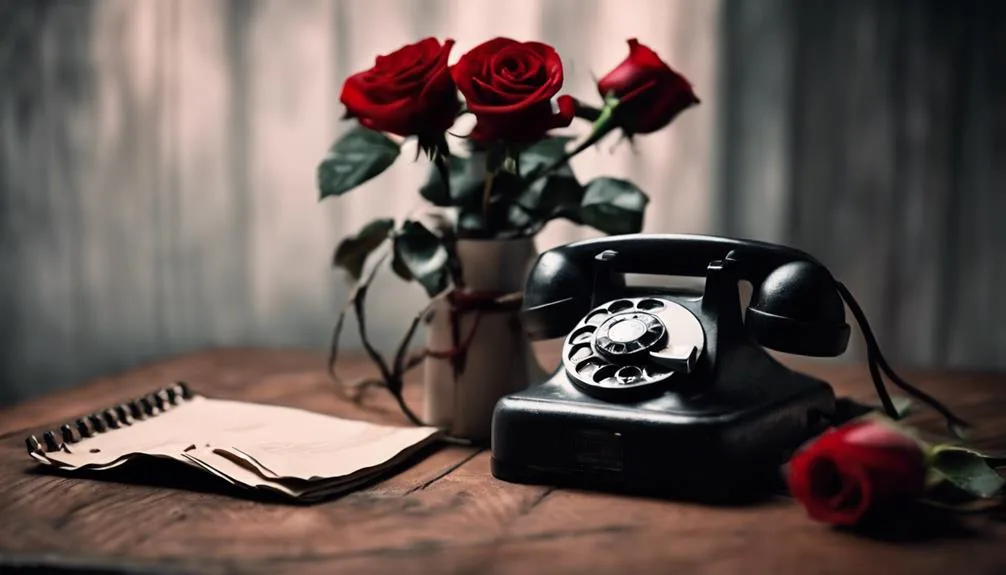You're feeling isolated, misunderstood, and constantly on edge; these aren't just bumps in the road, but may be red flags signaling deeper issues in your relationship.
It's crucial to differentiate between normal challenges and those that are harmful to your emotional well-being. By recognizing these signs early, you can decide whether it's time to seek support or reconsider the relationship altogether.
This discussion aims to equip you with the knowledge to discern these warning signals, prompting a closer examination of your partnership.
Continue for insights that could empower you to make the necessary adjustments or decisions for a healthier, happier relationship journey.
Key Takeaways
- Idolizing a partner can blur the lines between affection and adoration, masking potential relationship flaws.
- Isolation from social circles and intertwined identities signal unhealthy codependency.
- Communication breakdowns, marked by shallow interactions and lack of empathy, undermine relationship foundations.
- Signs of emotional distance, such as reluctance to share personal thoughts, indicate deeper intimacy issues.
Unhealthy Worship Dynamics
When someone idolizes you to the point of ignoring your flaws, it's a clear red flag indicating an unhealthy dynamic in the relationship. It's essential to recognize that such idolization boundaries often blur the line between genuine affection and unhealthy adoration.
While it might feel flattering at first to be placed on a pedestal, this level of worship can erode the foundation of mutual respect and understanding necessary for a healthy relationship. It's vital to address this imbalance early on.
Encouraging open and honest communication about each other's imperfections can help both partners see each other more realistically and foster a deeper, more authentic connection. Remember, a relationship thrives on genuine acceptance, not on an idealized version of one another.
Attachment and Isolation
Attachment and isolation in a relationship often start subtly, gradually pulling you away from your social circle and personal independence. This shift may not be evident at first, but it's crucial to recognize the isolation warning signs early on. Codependency dangers loom when your sense of self becomes too intertwined with your partner, highlighting the importance of boundaries for healthy independence.
Isolation can manifest as your partner discouraging you from seeing friends or pursuing hobbies. It's essential to maintain connections outside your relationship to foster a sense of self. Recognizing these red flags can be challenging, but it's vital for your emotional well-being. Establishing and respecting boundaries isn't just beneficial; it's necessary for a relationship to thrive, ensuring you don't lose yourself in the process.
Communication Breakdown

Recognizing isolation's impact on your relationships sets the stage for understanding how communication breakdown further complicates matters. Without healthy communication, you're missing a crucial tool for building connection. It's like trying to navigate a dark room without a light; you might manage, but the chances of stumbling increase significantly.
| Aspect | Healthy Communication | Signs of Breakdown |
|---|---|---|
| Initiation | Frequent and mutual | Rare or one-sided |
| Content | Deep and meaningful | Superficial or avoided |
| Response | Engaged and empathetic | Disinterested or absent |
When these elements falter, the foundation of your relationship begins to crumble. It's vital to address these issues promptly and collaboratively, fostering an environment where both partners feel heard, valued, and connected.
Trust and Transparency
Trust and transparency serve as the bedrock of any healthy relationship, yet they're often the first casualties in a partnership struggling to maintain open and honest communication. Jealousy issues can quickly erode trust, signaling deeper insecurities that overshadow the bond between you. When you notice dishonesty patterns emerging, it's crucial to address them. Consistent lies, even about minor things, can hint at a larger web of deceit.
Privacy concerns and hidden agendas further complicate matters, breeding a toxic environment of suspicion. If you're finding that your partner is overly secretive or has unexplained absences, it's a sign that the transparency needed to sustain your relationship is lacking. Navigating these red flags requires empathy, patience, and a willingness to confront uncomfortable truths together.
Emotional Distance

Emotional distance in a relationship can leave you feeling disconnected and alone, even when you're together. This gap often stems from emotional detachment and intimacy issues, making it hard to forge a deep, meaningful connection. Recognizing these signs is crucial:
- Your partner exhibits emotional unavailability, often withdrawing during times you need emotional support.
- There's a noticeable lack of empathy towards your feelings or situations, making you feel unheard.
- Intimacy issues surface, with a reluctance to share personal thoughts, fears, or dreams.
- Emotional detachment is apparent; your partner seems distant, not fully present during shared moments.
Understanding these red flags can help you address underlying issues, fostering a healthier, more connected relationship.
Future Goals Misalignment
When your dreams for the future diverge significantly from your partner's, it can create a profound rift in your relationship. It's crucial to recognize when you're facing conflicting values or career paths misalignment, as these can be clear indicators that you're not on the same page. Understanding and acknowledging these differences is key to assessing the sustainability of your partnership.
| Aspect | You | Partner |
|---|---|---|
| Career Goals | Entrepreneurial | Corporate Ladder |
| Family Planning | Desires Children | Prefers No Children |
| Lifestyle Preferences | Urban Dweller | Countryside Living |
Navigating these waters requires honest conversations and a willingness to compromise. Without alignment on these fundamental aspects, you're likely to encounter ongoing tension and dissatisfaction.
Disrespectful Behaviors

Recognizing misaligned future goals is crucial, yet equally important is addressing disrespectful behaviors that undermine the very foundation of your relationship. When you're faced with actions that disrespect your essence, it's vital to be aware and consider your next steps. Disrespect can manifest in various ways, often signaling deeper issues like manipulative behavior and power struggles.
Here are some key disrespectful behaviors to watch for:
- Belittling your opinions or achievements, making you feel less than.
- Ignoring your boundaries, showing a lack of respect for your personal space and decisions.
- Manipulative behavior to control or influence your actions for their own benefit.
- Engaging in power struggles, where one attempts to dominate over the other, eroding mutual respect and understanding.
Navigating these behaviors requires empathy, insight, and a professional approach, aiming for understanding and healthy relationship dynamics.
Frequently Asked Questions
How Can Cultural Differences Impact the Perception of Red Flags in a Relationship?
Cultural differences can affect how you perceive red flags in a relationship. Cultural sensitivity and understanding diverse communication styles are crucial. They shape expectations and can either mask issues or create misunderstandings.
Can a Relationship Recover From Established Red Flags, and What Steps Should Be Taken?
You might think it's too late, but relationships can recover from red flags with trust rebuilding and effective communication strategies. It requires mutual effort, honesty, and a deep commitment to understanding and respecting each other's needs.
How Do Red Flags Differ Between Early-Stage Dating and Long-Term Relationships?
In early dating, you might overlook mismatched communication styles or struggle with trust building. However, in long-term relationships, these red flags can deeply impact connection, highlighting the need for immediate attention and potential reassessment.
What Roles Do Social Media and Digital Communication Play in Exacerbating Relationship Red Flags?
Social media and digital communication can amplify red flags like privacy invasion and digital jealousy, making it harder for you to maintain personal boundaries and trust. It's crucial to address these issues early on.
Are There Any Psychological Factors That Make Certain Individuals More Prone to Ignore or Overlook Red Flags in Relationships?
Nearly 50% of people tend to overlook relationship red flags due to attachment styles or self-esteem issues, not realizing they're sacrificing their happiness. Understanding these psychological factors can lead to healthier, more fulfilling relationships.
Conclusion
In the dance of love, your steps should be in harmony, not a constant struggle to find the rhythm. While occasional missteps are part of every relationship, being perpetually off-beat, feeling isolated in a duet, or marching to vastly different tunes signal deeper troubles.
It's about finding balance between give and take, not losing yourself in the process. Remember, a partnership that dims your light isn't your stage. You deserve a relationship where you can shine together, illuminating each other's best parts.

